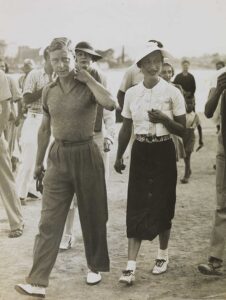In 1937, the British monarchy was in a state of turmoil. The previous king, Edward VIII, had abdicated the throne, leaving his unprepared and terrified brother Bertie to become George VI, surrounded by a gaggle of courtiers and politicians who barely thought him up to the job. Meanwhile, the now-Duke of Windsor moved forward with his plans to marry his mistress Wallis Simpson and took an increased interest in the expansionist plans of Hitler. Read more in the following excerpt from Alexander Larman’s The Windsors at War, a biographical chronicle of the Windsor family, as they go to war with Adolf Hitler—and each other.
Shortly before their wedding, Edward and Wallis received an unwelcome gift. It came in the form of anonymous correspondence entitled ‘Public Opinion – The Truth about Mrs Simpson’. Forwarded to the Metropolitan Police by Herman Rogers, the document called Wallis ‘a scheming adventuress’ and a ‘Delilah and a harlot . . . [who has caused] more grievous harm to the British empire than any other foreigner’. Special Branch declined to take any action, on the grounds that, as the assistant commissioner Norman Kendal mused, the allegations were ‘rather well done [and] surprisingly accurate’. The most scandalous details, which were treated as fictitious, concerned the apparent Nazi sympathies of both the duke and the duchess, arising from their friendship with a group of German-American social climbers. Had the truth been known, Kendal may have been less sanguine.

Charles Bedaux remains an enigma. Born in Paris in 1886, he emigrated to America in 1906, where he married, had a son, and worked in a series of menial jobs. He made his fortune from the development of an efficiency scheme of scientific management adopted by businesses around the world, the so-called ‘Bedaux System’, which calculated how much work per minute could be achieved by the average person in normal circumstances. By 1927, he was wealthy enough to have purchased the Château de Candé in the Loire, renovating it in 1930. He took no day-to-day part in his organization, but instead amused himself with financing polar expeditions and hunting big game. The former king and his new wife would be the most impressive specimens to grace his trophy room.
The wedding held at his home in June had few guests, but it brought international attention to his activities. Bedaux relished the publicity. He knew that his association with the duke and duchess could be advantageous, as he was anxious that the Nazi regime in Germany was unsympathetic to his business interests. Their continued operation had needed a large bribe to be paid to the German state, and for Bedaux to acknowledge that his German work would henceforth take place under the jurisdiction of the Arbeitsfront, the Nazi labor organization. It seemed likely that this situation would not last.
Bedaux knew that Edward was sympathetic towards the Germans, and so planned a high-profile visit by the duke and duchess to Germany in the autumn of 1937. This would promote Edward’s interest in how the Nazis had improved the lot of the ordinary working man—with a view to reporting the intelligence back to Britain—and additionally give Hitler a propaganda triumph. At the same time, Bedaux hoped to strengthen his own connections with a country that he believed would dominate Europe, and the world, over the coming years. He contacted Hitler’s adjutant Fritz Wiedemann, who confirmed that the Führer would be amenable to such a trip. Now all he had to do was convince Edward and Wallis.
He was helped by the deflation that both the duke and the duchess felt after their wedding. As with many newly married couples, the excitement of the day had swiftly worn off, and they knew that they remained pariahs as far as British society was concerned. One unwelcome reminder of Edward’s brief reign came in the form of a letter from his would-be assassin, George McMahon. After a failed attempt either to warn the former king, or to kill him, in July the previous year, McMahon was newly released from prison and continuing to make protestations of loyalty and affection. He included the detail that he had kept a picture of the duke on his cell wall, where others may have placed an image of a wife or sweetheart. Edward passed on McMahon’s unsolicited good wishes to Monckton to be dealt with in the usual fashion.
Other, more important figures were less forthcoming. The duke was furious that his mother had not bothered to send a wedding present, and wrote to say, ‘I was bitterly hurt and disappointed that you virtually ignored the most important event of my life’, hissing that ‘You must realize, by this time, that as there is a limit to what one’s feelings can endure, this most unjust and uncalled for treatment can have had but one important result; my complete estrangement from all of you.’ She did not reply.
The couple’s reputation in England had declined even amongst their intimates. Nicolson wrote in his diary of 14 July that at a dinner thrown by Edward’s former mistress, Sibyl Colefax, he sat next to Diana Cooper, who confided that she had turned against Mrs Simpson, saying, ‘I am the largest of all the rats.’ She also told Nicolson that Wallis had lied to all her friends that there had been no physical relationship between her and Edward prior to their marriage, and that it was likely that they had had sex on their cruise on the Nahlin the previous year, given the fact that they had had adjoining cabins.
The duke could no longer count on the loyalty of his former friends. Even as he wrote to Sibyl to thank her for a wedding present of a gilt dish and called their current situation ‘a real haven of rest after all we have been through’, he knew it was illusory. Exile particularly affected Wallis. Monckton wrote that ‘she wanted [Edward] to have his cake and eat it . . . she could not easily reconcile herself to the fact that by marrying her he had become a less important person’. She had informed Sibyl earlier in the year that ‘I am neither surprised or disappointed at the way people have behaved . . . it is a cruel world and honesty doesn’t seem to be the quality that gets you the longest way’.
The duke reserved his greatest contempt for his own family, egged on by Wallis. She told Sibyl that ‘I fail to understand how the Royal Family have allowed one of its members to be so unfairly attacked—it does not increase the prestige of anyone.’ The king wrote an anguished letter to his elder brother shortly after the wedding, complaining that the duke had caused their mother ‘a great deal of pain’. After claiming that ‘whatever I have done has been absolutely necessary for the sake of the country’, he bemoaned his own compromised situation. ‘How do you think I liked taking on a rocking throne, & trying to make it steady again? It has not been a pleasant job & it is not half finished yet.’ Even as he half-heartedly suggested that ‘I am only so anxious that we remain the best of friends’, he had to delete some of the more contentious passages from his letter, such as the suggestion that ‘all the bitterness is on your side’. Any neutral observer would have suggested its distribution was evenly weighed.
Copyright © 2023 by Alexander Larman

Alexander Larman is a British historian and journalist. He is the author of several acclaimed books of historical and literary biography, including Blazing Star, Byron’s Women, and The Crown in Crisis. He has also edited and ghostwritten for a variety of publications. He writes for the Times, Observer, and Telegraph, as well as The Spectator and The Critic. He lives in Oxford.
